Within the framework of on-going collaboration between the Centre for the Study of Islamic Manuscripts at Al-Furqān Islamic Heritage Foundation and the Institute of Arabic Manuscripts, and in co-operation with the Kuwait National Council for Culture, Arts and Letters, the Kuwait National Commission for Education, Science & Culture, and the National Library of Kuwait, the Centre organised a practical training course on the critical editing of Islamic manuscripts titled “Editing the traditional text”, which took place from 20 to 24 April 2014, at the National Library of Kuwait.
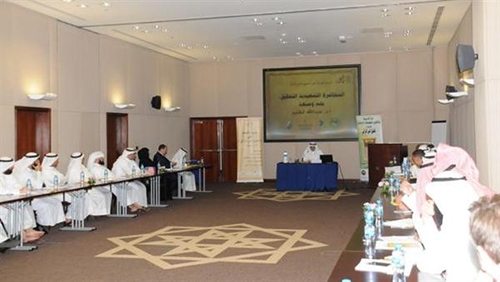
The course primarily targeted Kuwaiti researchers and students interested in the written heritage and the critical editing. It aimed to lay the foundation for new generations of editors, and further develop the skills of practitioners from academic bodies and organisations involved with heritage.
In the opening session on Sunday morning, 20 April, the Secretary-General of the Kuwait National Council for Culture, Arts and Letters, Engineer Ali al-Yuha, emphasised that researchers and cultural organisations shared the responsibility of preserving and recording mankind’s heritage. Since its inception, the National Council had undertaken many tasks, most notably to “protect and document folklore and Arab traditions”. He added that the training course, “Editing the traditional text”, was part of the National Council’s remit. He also indicated that the Council’s Secretariat had spared no effort to preserve and record human heritage and folklore in all its forms and instruments, whether through the Culture and Arts Division, represented in the Arab Heritage Inspectorate and the National Library of Kuwait, or the Council’s activities throughout the year.
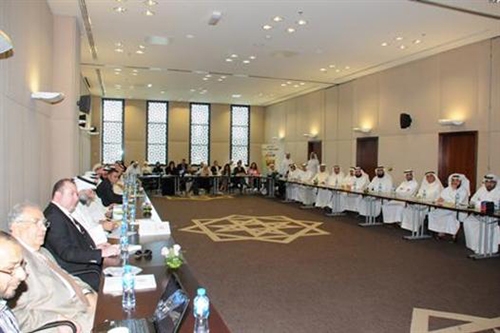
In his address, the Secretary-General of the Kuwait National Commission for Education, Science & Culture (UNESCO), Abdullatif Ahmed al-Baijan, said: “manuscripts occupy a prominent place in the perception of the humankind, as they are the historical, scientific, and linguistic memory of any nation; they are the source that enriches the sciences, culture, and arts, despite the constant advancement of knowledge and technology seen in the world”. Al-Baijan described UNESCO’s effective role in relation to manuscripts, based on its belief in the need to preserve the cultural and traditional identity of peoples. This was translated in practice through many agreements with centres who had expertise in preserving manuscripts, providing expertise and experts, holding training courses and workshops, and adopting numerous plans to save heritage and restore manuscripts, since in our time, many examples demonstrate the impact of war and conflict on mankind’s cultural heritage.
In turn, the Director of the Institute of Arabic Manuscripts, Dr Faysal al-Hafyan, pointed out that Kuwait is credited with playing a major part in founding the Institute of Arabic Manuscripts, and that the issue of written heritage was extremely important, because manuscripts are the most capable of building human civilisation. He indicated that this was the first training course of its kind dedicated to the issue of editing traditional texts, and emphasised that tackling the ‘text’, in what is known as the “craft of critical editing”, required special tools, most importantly the ethics of editing, in addition to the other professional tools.
The Managing Director of Al-Furqān Islamic Heritage Foundation, Mr Sali Shahsivari, expressed his appreciation and gratitude to the State of Kuwait, for its generous hospitality and warm reception. He also articulated his pleasure at this collaborative work between the four centres, and praised all the participants in the training course. He proceeded to describe Al-Furqān Foundation’s keen interest in the process of comprehensively surveying all Islamic manuscripts. He asserted that countless manuscripts can be found in over a hundred countries, and that Al-Furqān Foundation has catalogued about a hundred thousand manuscripts, held in important libraries around the world. He explained that Al-Furqān Foundation worked along four core strands, namely editing texts on Qurʾān and its sciences, Islamic Jurisprudence (fiqh) and Legal Theory (uṣūl), and science and history manuscripts, in addition to preserving and editing Palestinian heritage as a fifth strand within the interests of Al-Furqān Foundation.
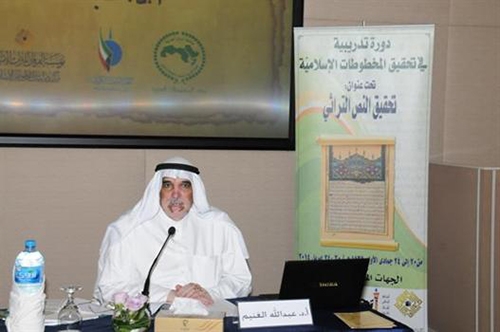
Following the opening ceremony of the training course, an introductory lecture titled “Critical editing: science and craft”, was delivered by the Director of the Center for Research and Studies on Kuwait, Dr Abdullah Yusuf al-Ghunaim, who had been honoured by the National Council Secretariat, on the occasion of his selection as 2014 Heritage Personality of the Year. In his lecture, Al-Ghunaim highlighted the importance of critically editing written heritage, and that many historical manuscripts and books deserved to be re-examined and reworked; indeed, he stressed that many well-known heritage books had been improperly edited.
The training course covered many themes, including the essential steps in the editing craft, starting with a process of reflection in selecting a particular text, followed by documenting it, systematically searching for manuscript copies, and then reading, editing, critiquing and studying the text.
Course lectures were delivered by a group of specialists, headed by Dr Abdullah al-Ghunaim, Professor Ibrahim Chabbouh, Dr Faysal al-Hafyan, Dr Muhammad Ahmad Al-Dali, and others.
On Thursday, 24 April, the National Library of Kuwait witnessed the conclusion of the training course “Editing the traditional text”, where the Secretary-General of the Kuwait National Council for Culture, Arts and Letters, Engineer Ali al-Yuha, emphasised that the National Council’s concern was to build Kuwait’s national expertise, in citizens having the experience and skill in the craft of critically editing heritage and reading manuscripts, referring to the plan for achieving this during the current year. Al-Yuha praised the efforts of all the researchers and trainers, who had taken part in, and organised the course. He highlighted that their participation in the workshops represented added value in the area of scientific research on documenting heritage. He alluded to the convergence of effort by the National Council and private institutions, with a focus on intensifying such important courses. He also pointed to the potential in harnessing technology for critical editing of heritage, which would enrich successive generations. He noted that the large number of participants is evidence of the importance of the course.
For his part, Professor Ibrahim Chabbouh, member of the Board of Experts at Al-Furqān Islamic Heritage Foundation, valued this joint effort between the organisations in arranging the course, and encouraged such initiatives. He also emphasised that the issue of heritage is not captive to time, because heritage is our extension into the past, and our tool in the present, dedicated to searching for modern values serving as our foundation in the future. He highlighted that through translation, Islamic heritage had been directly transformed into a motive force and effective element in the evolution of modern science, which we currently enjoy. He indicated that heritage gives us a sense of self within modern civilisation.
Dr Faysal al-Hafyan, Director of the Institute of Arabic Manuscripts, renewed his gratitude and appreciation to the State of Kuwait, and emphasised that the training course “Editing traditional text” was not a typical short course, rather it was one that would open horizons in the different fields of collaboration, and contribute to the heritage revival movement, considered one of the topical issues in modern times, as it is symbolic of leveraging what is beneficial in history, to meet the needs of the present, and build the future.
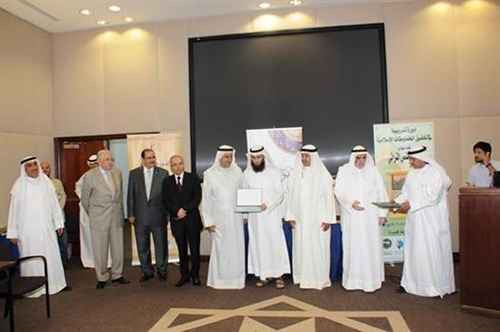
On behalf of the course participants, over 50 researchers and trainees, Mr Saleh Misbah delivered a speech thanking the organisations of the training course and the professors who provided the training. He said: “In the name of the participants in the training course, we express to you and to the organisers our wholehearted gratitude and appreciation for all your effort in seeking to disseminate knowledge and train new generations in the art of editing heritage”. He emphasised the huge benefit to the participants from the course, and the quantity of information that would sustain them in continuing research and study in the area of editing heritage, and expressed his hope that the organisers would continue this joint work, and hold similar workshops and scientific courses in this rich and vital area.
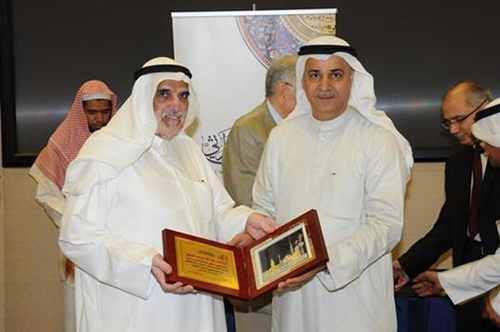
Subsequently, Secretary-General, Engineer Ali al-Yuha, Dr Abdullatif al-Baijan, Dr Hussain al-Ansari, Dr Abdullah al-Ghunaim, Dr Faysal al-Hafyan, Professor Ibrahim Chabbouh and Mr Mohamed Drioueche honoured the course delegates by giving out certificates of recognition for their participation. The course lecturers were similarly honoured in this ceremony.

